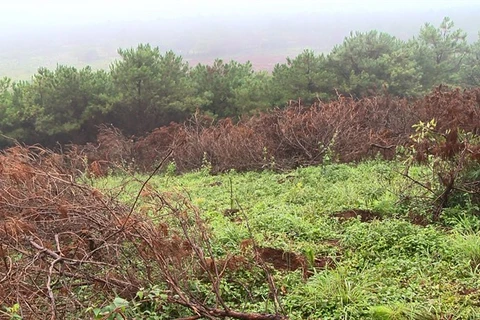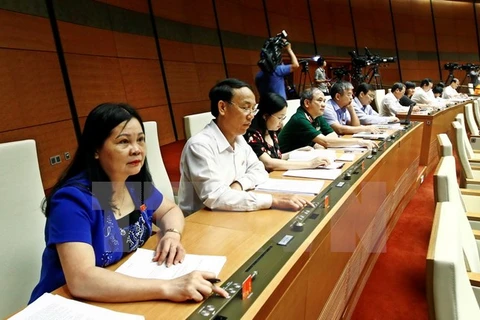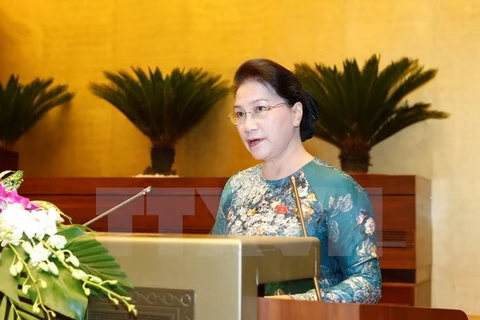Hanoi (VNA) – The President Office hosted a press conference on July 12 to announce six laws that were adopted during the third plenary session of the 14th National Assembly.
They are Law on Foreign Trade Management, Law on Small and Medium-Sized Enterprise Support, Law on Technology Transfer, Tourism Law, Irrigation Law, and Railway Law.
With 8 chapters and 113 articles, the Law on Foreign Trade Management will take effect on January 1, 2018, aiming to regulate State management over foreign trade activities without interference in specific activities of traders.
For the first time, the law affirms the freedom of import and export business of merchants, excepting for areas banned by the law.
Meanwhile, the Law on Small and Medium-Sized Enterprise (SME) Support defines that SMEs are firms having maximum 200 employees, annual revenue of less than 300 billion VND and capital of under 100 billion VND. It also clarifies support to SMEs in various fields, including credit access, tax, land use, market and technical infrastructure. It will become effective on January 1, 2018.
The Law on Technology Transfer, which will come into force on July 1, 2018, is developed based on the Law on Technology Transfer 2006. The law has new mechanisms to assist and encourage businesses to renovate its technology, as well as rules on commercializing scientific research and technological development outcomes and measures to develop the science and technology market.
Becoming operational on January 1, 2018, the Tourism Law pays greater attention to ensuring the quality of tourism services through regulations on granting domestic travel business licences, along with simplified administrative procedures.
Comprising 10 chapters and 60 articles, the Law on Irrigation considers water as a kind of goods and irrigation services as input costs in production, thus raising public awareness of using water effectively and economically. The law will take effect on July 1, 2018.
Looking towards further development of the railway sector, the Railway Law has 10 chapters and 87 articles, up two chapters and down 27 articles compared to the 2005 version. It is supplemented with clearer regulations on railway infrastructure building, railway business, railway industry, and special railway development.
Particularly, the law include first-ever regulations on high-speed railway, which serve as an important legal framework for investment in the field in the future. The law will take effect on July 1, 2018-VNA
They are Law on Foreign Trade Management, Law on Small and Medium-Sized Enterprise Support, Law on Technology Transfer, Tourism Law, Irrigation Law, and Railway Law.
With 8 chapters and 113 articles, the Law on Foreign Trade Management will take effect on January 1, 2018, aiming to regulate State management over foreign trade activities without interference in specific activities of traders.
For the first time, the law affirms the freedom of import and export business of merchants, excepting for areas banned by the law.
Meanwhile, the Law on Small and Medium-Sized Enterprise (SME) Support defines that SMEs are firms having maximum 200 employees, annual revenue of less than 300 billion VND and capital of under 100 billion VND. It also clarifies support to SMEs in various fields, including credit access, tax, land use, market and technical infrastructure. It will become effective on January 1, 2018.
The Law on Technology Transfer, which will come into force on July 1, 2018, is developed based on the Law on Technology Transfer 2006. The law has new mechanisms to assist and encourage businesses to renovate its technology, as well as rules on commercializing scientific research and technological development outcomes and measures to develop the science and technology market.
Becoming operational on January 1, 2018, the Tourism Law pays greater attention to ensuring the quality of tourism services through regulations on granting domestic travel business licences, along with simplified administrative procedures.
Comprising 10 chapters and 60 articles, the Law on Irrigation considers water as a kind of goods and irrigation services as input costs in production, thus raising public awareness of using water effectively and economically. The law will take effect on July 1, 2018.
Looking towards further development of the railway sector, the Railway Law has 10 chapters and 87 articles, up two chapters and down 27 articles compared to the 2005 version. It is supplemented with clearer regulations on railway infrastructure building, railway business, railway industry, and special railway development.
Particularly, the law include first-ever regulations on high-speed railway, which serve as an important legal framework for investment in the field in the future. The law will take effect on July 1, 2018-VNA
VNA























